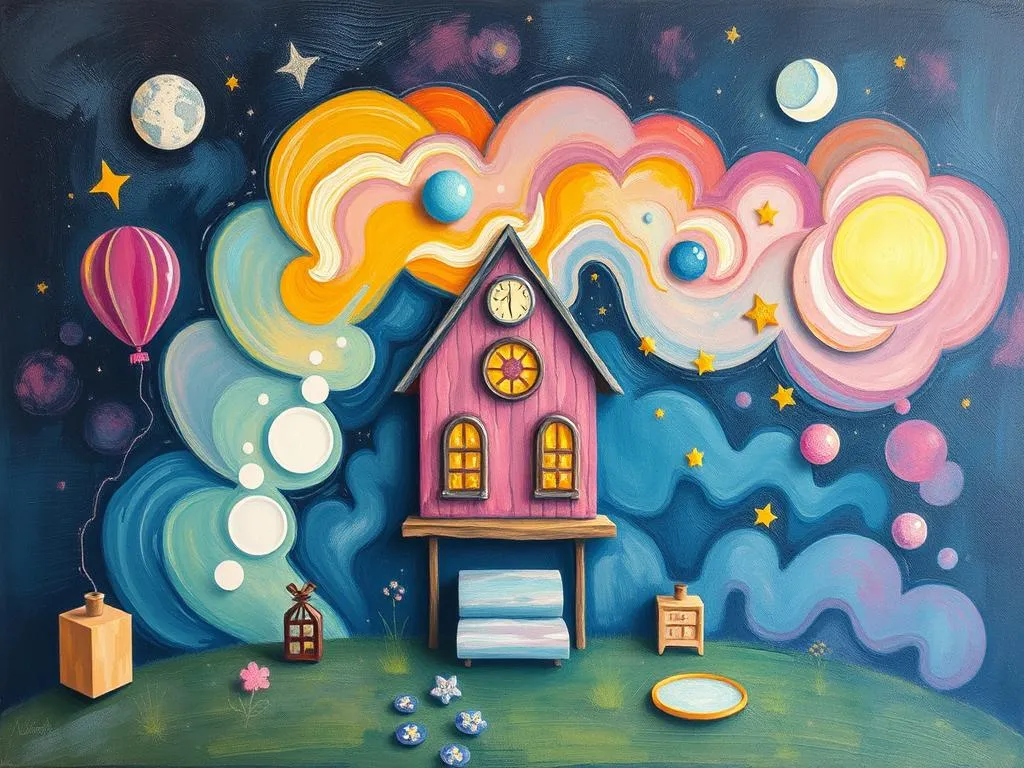
Have you ever awoken from a dream where you found yourself wandering through a house that felt eerily familiar yet entirely foreign? Perhaps you entered rooms that seemed to reflect parts of your life you hadn’t acknowledged or discovered hidden spaces that symbolized your deepest thoughts and emotions. Dreams about homes can be profound invitations to explore our inner selves, revealing layers of meaning connected to our past, present, and future.
Your home in dreams often serves as a symbolic landscape, a reflection of your psyche, experiences, and aspirations. Like an architect of your own inner world, the structure of your dreams can hold keys to understanding your emotional state, desires, and even fears. Join me as we embark on a journey through the intricate architecture of your dream home, revealing the profound messages embedded within its walls.
Foundations of the Mind: Decoding Home Symbolism
In the realm of dream interpretation, homes are not simply physical structures; they embody our sense of identity, security, and emotional well-being. Each room, hallway, and hidden nook can represent different aspects of your life, from your childhood memories to your current relationships. Here are some key concepts to consider when interpreting the symbols of your dream home:
-
The Front Door: Often seen as a gateway to new opportunities, the front door symbolizes access to your inner self. A locked or broken door may indicate feelings of barriers or insecurities in your waking life, suggesting a desire for change or exploration.
-
The Basement: This subterranean space frequently signifies your subconscious mind, housing repressed emotions, fears, or unacknowledged aspects of yourself. If your dream home features a dark, cluttered basement, it may be time to confront what lies beneath the surface.
-
The Attic: Representing the higher consciousness, the attic often contains memories, wisdom, and insights from your past. Dreaming of an attic filled with forgotten treasures can symbolize the importance of reflecting on your experiences to inform your current decisions.
-
Rooms and Spaces: Each room in your dream home can symbolize various facets of your life. For example, a cozy living room may signify relationships and social connections, while a chaotic kitchen could represent your emotional state or how you manage daily challenges.
-
The Garden: If your dream home includes a garden, it often symbolizes growth and nurturing. A flourishing garden may represent personal development and the potential for new beginnings, while a neglected one may point to areas in your life that require attention and care.
By engaging with these symbols, you can glean insights into your emotional landscape and identify areas of your life that may need nurturing or exploration.
Wandering the Halls: Dream Scenarios to Ponder
Let’s take a stroll through some common dream scenarios involving homes. Each situation presents an opportunity to reflect on the emotional undertones and themes that might resonate with you.
1. The Expanding House
You find yourself in a house that keeps expanding, with new rooms appearing as you explore. Each room seems to hold different memories or experiences.
Interpretation: This scenario may indicate personal growth and the expansion of your identity. It suggests that you are evolving and uncovering new aspects of yourself. Embrace this growth; it may lead to exciting opportunities.
2. The Unfinished House
You dream of a house that is only partially constructed, with exposed beams and missing walls.
Interpretation: An unfinished house can symbolize incompleteness or transition in your life. Perhaps you are navigating a phase of uncertainty or change, feeling like you are not yet ready to fully inhabit your life. This may be a gentle nudge to evaluate what areas require more attention or structure.
3. The Abandoned House
You wander through a dusty, abandoned house filled with forgotten belongings.
Interpretation: This dream can signify nostalgia or unresolved issues from your past. The abandoned space might represent feelings of neglect or loss, urging you to confront old memories or relationships that need closure. Reflect on what these memories mean to you and how they shape your present.
4. The Flooded Home
You wake up in a dream where your home is flooded, with water rising through the floors.
Interpretation: Water often symbolizes emotions, and a flooded home may indicate being overwhelmed by feelings or situations in your life. This dream may be prompting you to address these emotions, seek support, or find healthier coping mechanisms.
5. The House of Mirrors
You find yourself in a house where every room is lined with mirrors, reflecting various versions of yourself.
Interpretation: A house of mirrors can suggest self-exploration and introspection. It may be time to examine your self-perception and the different roles you play in life. Are there aspects of yourself that you are neglecting or not fully embracing?
Each of these scenarios invites you to explore the layers of your consciousness and consider how they may reflect your waking life.
Building a Brighter Future: Personal Growth Through Dream Insight
Now that we’ve explored the symbolism and scenarios within your dream home, let’s turn our attention to how you can use these insights for personal growth. Dreams are not merely stories we tell ourselves while we sleep; they can serve as guides toward deeper self-awareness and transformation.
-
Keep a Dream Journal: Recording your dreams can illuminate patterns and themes that recur over time. Reflecting on your dreams allows you to connect the dots between your subconscious and conscious thoughts. Consider writing down your feelings upon waking, as they can provide valuable context for your interpretations.
-
Engage in Self-Reflection: After interpreting your dreams, take time to reflect on how these insights resonate with your waking life. Ask yourself questions like: What emotions are emerging for me right now? Are there areas of my life that require more attention or healing? This practice can deepen your understanding of yourself.
-
Create a Vision Board: Inspired by the themes in your dreams, consider creating a vision board that reflects your aspirations and goals. Include imagery that resonates with the feelings and insights you’ve derived from your dream home. This act can serve as a powerful reminder of your journey toward personal growth.
-
Seek Support: Sometimes, the emotions and insights revealed in dreams can be overwhelming. If you feel uncertain or troubled by your dreams, consider discussing them with a trusted friend, therapist, or counselor. Engaging in conversation can provide additional perspectives and support in your journey.
-
Practice Mindfulness and Grounding Techniques: As you navigate the emotions stirred by your dreams, incorporating mindfulness and grounding practices can help you stay centered. Techniques such as meditation, deep breathing, or spending time in nature can cultivate a sense of calm and clarity.
By embracing the messages contained within your dream home, you can actively participate in your personal journey. Dreams offer a unique lens through which to view your life, illuminating paths for healing, growth, and transformation.
Reflecting on your dream home can be a powerful catalyst for change. The next time you find yourself wandering through its rooms, take a moment to pause and listen to what it has to say. What stories do the walls hold? What lessons can be learned from the spaces you inhabit?
As you embark on this journey of self-discovery, remember that your home—both in dreams and reality—is a living expression of who you are. May you find the courage to explore its depths, embrace its intricacies, and construct a life that feels as warm and welcoming as the dream home you’ve always imagined.







